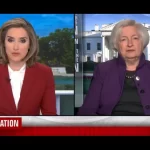Garry Tan, the president and CEO of Y Combinator, recently stated that the collapse of Silicon Valley Bank is an “extinction-level event” for tech startups. Y Combinator has helped launch more than 4,000 tech companies including Airbnb, DoorDash, and Stripe.
MarketWatch reports that the failure of Silicon Valley Bank (SVB) has sent shockwaves through the tech startup community, with fears that it could set innovation back by a decade. Garry Tan, the CEO of startup accelerator Y Combinator, called it an “extinction-level event” for startups, warning that the loss of these small businesses could significantly impact the economy.

SANTA CLARA, CALIFORNIA – MARCH 10: People line up outside of the shuttered Silicon Valley Bank (SVB) headquarters on March 10, 2023 in Santa Clara, California. (Justin Sullivan/Getty Images)
Tan stated: “This is an ‘extinction-level event’ for startups and will set startups and innovation back by 10 years or more. BIG TECH will not care about this. They have cash elsewhere. All little startups, tomorrow’s Google’s and Facebooks, will be extinguished if we don’t find a fix.”
The fall of SVB is the largest bank failure since the collapse of Washington Mutual in 2008, and its closure has left thousands of startups in a precarious position. By the end of 2022, the bank had 13 locations operating in California and Massachusetts, $209 billion in total assets, and $175.4 billion in deposits. Since many startups had made SVB their only bank, the $250,000 in FDIC deposit insurance would not be enough.
Breitbart News economy editor John Carney wrote:
The collapse of Silicon Valley Bank was caused by a massive run on the bank, with customers initiating withdrawals of $42 billion this week.
The bank was placed into Federal Deposit Insurance Corp. receivership on Friday after the California Department of Financial Protection and Innovation (DFPI) determined the bank had been rendered insolvent.
Prior to the run on the bank, the bank was in “sound financial condition,” according to the DFPI. Customers withdrew $42 billion, leaving the bank with a negative cash balance of $958 million.
Here’s the summary of what happened from the DFPI’s order taking possession of the bank:
On March 8, 2023, the Bank announced a loss of approximately $1.8 billion from a sale of investments (U.S. treasuries and mortgage-backed securities). On March 8, 2023, the Bank’s holding company announced it was conducting a capital raise. Despite the bank being in sound financial condition prior to March 9, 2023, investors and depositors reacted by initiating withdrawals of $42 billion in deposits from the Bank on March 9, 2023, causing a run on the Bank. As of the close of business on March 9, the bank had a negative cash balance of approximately $958 million. Despite attempts from the Bank, with the assistance of regulators, to transfer collateral from various sources, the Bank did not meet its cash letter with the Federal Reserve. The precipitous deposit withdrawal has caused the Bank to be incapable of paying its obligations as they come due, and the bank is now insolvent.
Prior to its collapse, Silicon Valley Bank was the 16th largest bank by assets in the U.S. Federal Reserve data shows the bank had $209 billion in assets as of December 31, 2022.
Tan has been outspoken in his requests that steps be taken to help these startups. He has pleaded with the Federal Deposit Insurance Corp. (FDIC) to end the receivership as soon as possible and issued a dire warning that many startups would be forced to close their doors in the absence of prompt action.
By subscribing, you agree to our terms of use & privacy policy. You will receive email marketing messages from Breitbart News Network to the email you provide. You may unsubscribe at any time.
“The most important thing the FDIC and the US Government can do right now is make the receivership as short as possible,” Tan tweeted. “There are thousands of U.S. startups that banked at SVB, often as their sole bank. $250K per account is not going to last long.”
Tan warned of the knock-on effect of these “thousands of small businesses” which are “big drivers of GDP,” going under, stating: “They’re never going to get a chance to be that in the future, and that will be to the detriment of thousands of jobs, if not tens of thousands of jobs, in the future.”
“The financial world does not have the capability to save these companies, like, we will just wholesale throw out startup innovation in America if we allow these companies to die in the next few weeks, and it really is a matter of next week.”
Customers have been guaranteed by the FDIC that their deposits are secure and that the bank will open again on Monday. However, many startups are still worried about how this will affect their companies. Tan reported that businesses have been calling him to inquire how they will be able to pay their employees given that all of their money is in SVB accounts.
“What the FDIC really does need to do is take into account these people,” Tan said. “These are the small guys who, if we damage them, it hurts us all. This is a national-security issue. … This will splash across all of the economy.”
Read more at MarketWatch here.
Lucas Nolan is a reporter for Breitbart News covering issues of free speech and online censorship. Follow him on Twitter @LucasNolan


